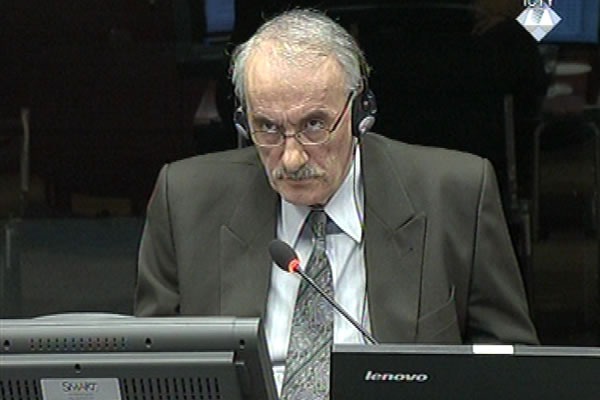Home
VIDOJE BLAGOJEVIC’S ‘DEFENSE ZONE’
Through the evidence of the former commander of the Bratunac Brigade, Ratko Mladic’s defense is trying to prove that the Bosnian Serb army did not issue ‘illegal’ orders that violated laws of war or endangered prisoners’ lives. The witness was convicted by the Tribunal for the Srebrenica crimes
 Vidoje Blagojevic, defence witness at Rako Mladic trial
Vidoje Blagojevic, defence witness at Rako Mladic trial Through the evidence of Vidoje Blagojevic, former commander of the Bratunac Brigade, Ratko Mladic’s defense is trying to prove its argument that there were no ‘illegal planned actions against the Muslims in Srebrenica’ in July 1995. Blagojevic was convicted by the Tribunal for ‘aiding and abetting the killing of Bosnian Muslims in Bratunac’ and the persecution of Muslim civilians in Srebrenica. After Blagojevic served three fourths of his 15-year sentence, he was granted early release in December 2012.
In his statement to Mladic’s defense, Blagojevic claimed that the orders issued by the VRS Drina Corps in July 1995 were in line with the rules of engagement and didn’t instigate violations of laws and customs of war. The VRS attack was carried out as a consequence of the fact that the establishment of the Srebrenica and Zepa enclaves ‘divided the Podrinje area’; furthermore, the enclaves were not demilitarized as the agreement on their establishment envisaged, and Muslim forces launched armed attacks on the VRS positions, particularly on the Bratunac Brigade.
Blagojevic claims that before, during and after the attack on the enclaves he didn’t receive any ‘unlawful’ orders from the Drina Corps command or the VRS Main Staff. Also, he personally never issued any order that violated the laws and customs of war. Soldiers in the units under his command did not kill any person from Srebrenica, Blagojevic explained. According to Blagojevic, the Bratunac Brigade command or indeed any other superior command never issued any orders that would result in ‘endangering the lives’ of the prisoners from Srebrenica or the incitement to any illegal activities.
At the beginning of the cross-examination, the prosecutor recalled that Blagojevic was convicted by the Tribunal for aiding and abetting the Srebrenica crimes. The prosecutor asked Blagojevic if he accepted his responsibility for that. ‘That is an illegal judgment of this Tribunal’, the witness said. When the presiding judge intervened, the witness replied that he would not accept his responsibility for the crimes he was convicted of.
The prosecutor tried to discredit the witness by showing a number of documents which indicate that Blagojevic had to have known at least about the crimes committed in the area of responsibility of his brigade.The witness denied the allegation, mostly by contesting the facts contained in the documents; Blagojevic claimed that he wasn’t responsible for the entire territory in the area of responsibility of the Bratunac Brigade and that the combat reports he personally wrote in July 1995 were inaccurate.
Blagojevic argued that his responsibility was limited only to the ‘defense zone’. According to him, the zone was the demarcation line between the Srebrenica enclave and the command posts and rear echelon units. However, when the prosecutor showed Blagojevic the map, the witness wasn’t able to mark his area of responsibility. When the judges insisted that he do it, the witness complained of poor eye sight and other problems.
Blagojevic denied that on 15 July 1995 he was appointed the commander of the troops involved in the search and clean-up operation after the fall of Srebrenica. The prosecutor showed Blagojevic a daily combat report for 16 July 1995, in which the Drina Corps is informed that the ‘Bratunac Brigade commander visited all units blocking the enemy withdrawal (…), issued tasks and organized their coordinated actions’. Blagojevic didn’t deny that he wrote the report, but he claimed that the events described in it never actually happened.
According to the prosecution, the document clearly shows that Blagojevic coordinated the actions of all the units involved in the operation whose objective was to kill off the enemy troops as they were retreating. The repeated attempts by the judges to establish if a combat report could contain ‘lies’ were rebuffed by Blagojevic, who kept saying it was a ‘supposition’, but Blagojevic was not able to explain what a supposition was.
Linked Reports
- Case : Mladic
- 2015-03-23 WHO ARE TURKS FROM GORAZDE?
- 2015-03-20 PROSECUTION OPPOSES FOUR-MONTH BREAK AT MLADIC TRIAL
- 2015-03-19 FROM DEFENSE TO SELF-DEFENSE
- 2015-03-25 HOW CAPTURED SREBRENICA MEN WERE PROTECTED AGAINST NATO STRIKES
- 2015-03-26 DELETED FROM TAPES AND WITNESS MEMORY
- 2015-03-26 UNPLEASANT MEMORIES
